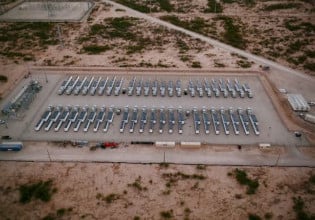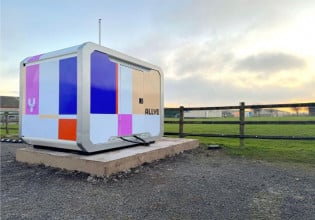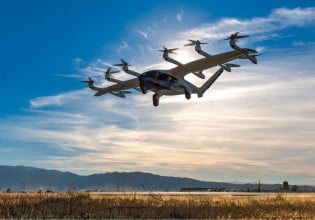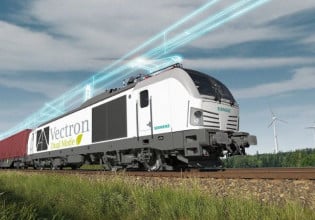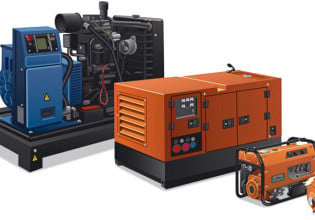DOE Funding for EV Charging, Development Projects
Another round of Department of Energy funding announcements graces America’s electric vehicle market. Here’s a briefing.
The U.S. Department of Energy is ramping up its funding opportunities in the electric vehicle market to support the federal government’s 2030 target for EVs to claim 50% of all car sales.
A charging port juices up a Rivian EV. Image used courtesy of ChargePoint
To that end, the agency unveiled two funding announcements providing $187 million for EV development and another $51 million to expand charging technologies. It also launched a new clean fuels initiative targeting the transportation and industrial sectors.
We’ll unpack the details here.
$187M for EV Development Projects
The announcement offers $187 million through two programs. For the first, the DOE tapped 45 projects receiving $87 million to improve EV materials development, create new concepts to lower emissions from off-road vehicles and rail and maritime transportation, develop workforce training programs, and expand EV options in disadvantaged communities.
The projects span 18 states and cover several sub-topics: Several projects aim to develop EV charging for consumers without residential charging infrastructure, with a plan to install charging stations across more than 2,500 multi-family properties. Thirteen projects will task local organizations to develop clean energy plans for underserved communities. Another ten projects will demonstrate electrification applications for school buses, food/goods delivery e-bikes, and commercial fishing boats.
Other projects will develop new hardware and materials to boost EV efficiency by reducing weight and costs and minimizing the reliance on rare earth elements. Plus, several awardees will research and validate charging solutions for off- and non-road EVs in the aviation and agriculture sectors.
The recipients include major companies such as General Motors, Caterpillar, and Deere & Company, alongside universities, nonprofits, and municipal entities. Of all award allocations, the highest federal cost-sharing went to General Motors, receiving $11.2 million for two projects focusing on a GaN-enabled dual multilevel inverter integrated electric drive system and ultra conducting composites for advanced electric motors. Cummins also grabbed $5 million to develop an optimized low-carbon fuel range extender.
$99M to Lower EV Production & Material Costs
As a companion to that announcement, the DOE opened applications on a new $99.5 million funding opportunity to support projects to reduce the costs of improving EV charging infrastructure in underserved communities and develop batteries with low-cost, widely available materials.
The program will allocate 37 to 63 awards across several areas. The topic receiving the highest investment is $15 million for two to four projects to reduce the soft costs of EV infrastructure to boost widespread deployment. Second to that is $12 million for up to four projects focusing on high-capacity long-lifecycle lithium-sulfur battery development, followed by $10 million for advanced integrated onboard charging systems and another $10 million for public transportation system approaches.
Other categories focus on the circularity and sustainability of polymer composites for reducing vehicle weight ($8 million), hydrogen combustion engines ($7 million), advanced wireless charging concepts for heavy-duty vehicles ($5 million), and improved 12-volt lead acid batteries for safety-critical applications ($5 million). Smaller award shares will go towards domestic magnesium production research ($4 million), mechanistic modeling of lithium-sulfur batteries ($3 million), novel lightweight materials ($3 million), and dimethyl ether engines for off-road vehicles ($2.5 million).
The program also supports non-technical projects, offering around $10 million for consumer education campaigns and other outreach and training programs from the Clean Cities Coalition Network, a DOE division.
$51M for EV Charging
The DOE also launched a $51 million FOA funded by the Bipartisan Infrastructure Law, called the Ride and Drive Electric program. The program aims to boost America’s EV charging infrastructure with a national network of 500,000 public charging ports, up from 140,000 today, to serve the three million-plus EVs already on the road.
The funding will help test and validate new charging equipment, advance business models for shared charging and fleet-based services, and provide jobs and training resources for underserved communities. It also aims to improve EV charging performance and reliability by boosting the commercial capacity to test and certify high-power EV chargers and validate public infrastructure's real-world performance and reliability.
Per the FOA, the DOE expects to make 24 to 40 awards under the program, with each ranging from $250,000 to $4 million.
An overview of the topic areas and award details in the DOE’s Ride and Drive Electric funding program. Image used courtesy of the Joint Office of Energy and Transportation
Alongside that announcement, the DOE also launched its National Charging Experience Consortium (ChargeX), a program led by the Idaho National Laboratory to advance technologies providing a convenient and reliable charging experience for drivers using American-made chargers.
ChargeX has secured commitments from nearly 30 companies and organizations, including EV makers like Tesla and General Motors, charging networks such as EVgo and ChargePoint, and other technology and service providers, including ABB, Siemens, and J.D. Power.
Clean Fuels & Products Earthshot
The DOE also launched the Clean Fuels & Products Earthshot to reduce greenhouse gas emissions by developing sustainable feedstocks and conversion systems to produce clean fuels and materials that compete with components deriving from petroleum. The program aims to meet the projected 2050 decarbonization demands for 100% of aviation fuel, half of maritime/rail/off-road fuel, and half of carbon-based chemicals.
The program is estimated to cut more than 650 million metric tons of carbon emissions annually by 2050.




